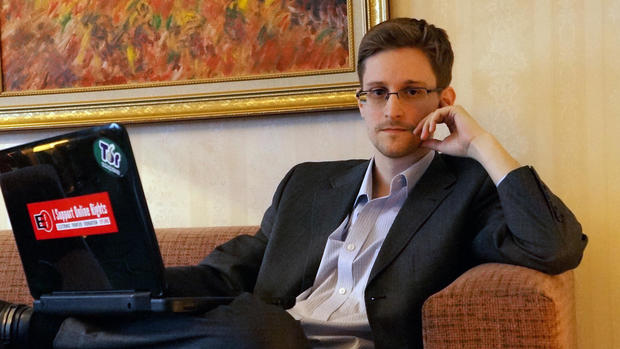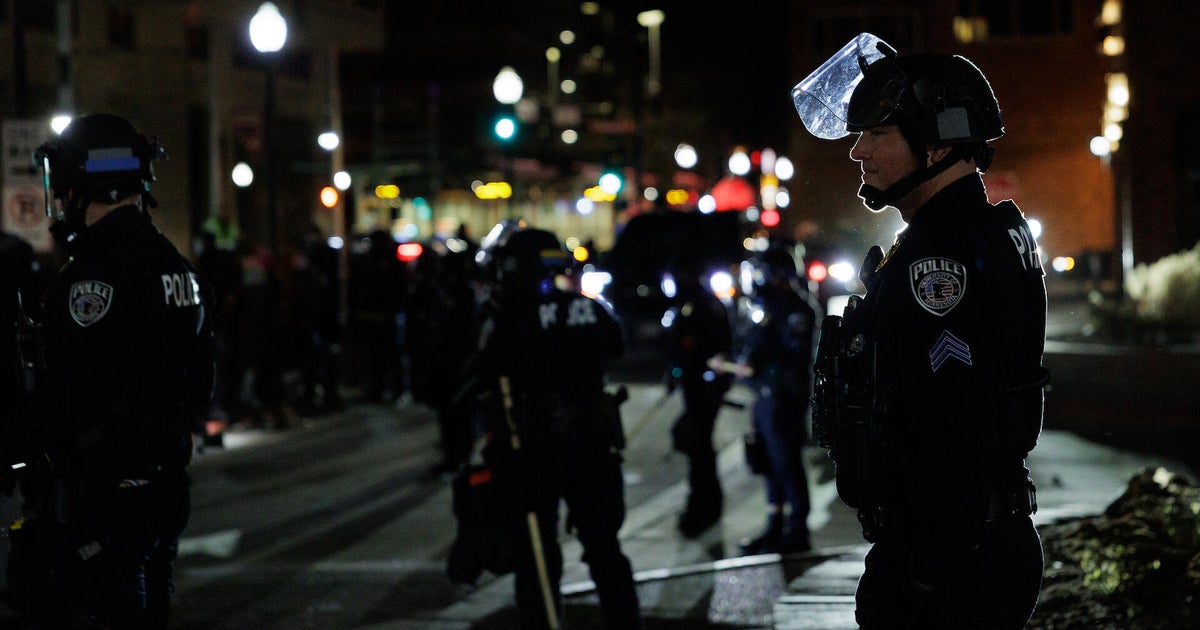Reality Winner and the debate over the Espionage Act
When a National Security Agency whistleblower leaked a document related to Russia's cyber spying, she says she never expected that she would be charged with espionage herself. Now Reality Winner's high-profile case has resurrected a debate over prosecution of national security leakers.
In 2017, Winner mailed a top-secret document to an online news outlet intending to set the record straight about which foreign entity had interfered in the 2016 presidential election. After he took office, President Donald Trump continued to equivocate when speaking about Russian interference, including the attack on the Democratic National Committee.
But there had been another hack that targeted the state and local officials who managed voter registration systems. The NSA — and by extension, the White House — had evidence the attack had been carried out by Russian military intelligence. Winner, then an intelligence contractor at the NSA, saw the classified report on an in-house newsfeed in early May 2017.
In an interview with 60 Minutes, Winner told correspondent Scott Pelley she was aware of what she was doing when she anonymously mailed the report to The Intercept.
"I knew it was secret," she said. "But I also knew that I had pledged service to the American people. And at that point in time, it felt like they were being led astray."
Winner was arrested two days before The Intercept published the document in June 2017, and within hours of publication, the Justice Department announced she had been charged under the Espionage Act. After more than a year in pre-trial detention, Winner pleaded guilty to the espionage charge.
She was sentenced to 63 months in prison — the longest sentence ever imposed against a civilian for leaking information to the media. In total, she spent four years behind bars and five more months on home release. She now faces three years of supervised release, including a curfew and restrictions on her travel.
THE HISTORY OF THE ESPIONAGE ACT
Winner's conviction has added to a century-long controversy over the Espionage Act and its relationship to free speech.
Passed two months after the United States entered World War I in 1917, the Espionage Act made it a crime to communicate information that would interfere with American war efforts or help the country's enemies.
But the Espionage Act went beyond spying and into territory that put it in contention with First Amendment free speech protections. When it was passed in 1917, the Espionage Act limited public dissent against the war and banned any action that interfered with the military draft effort. An amendment to the law, known as the Sedition Act of 1918, briefly barred criticism of the war effort before it was repealed.
As a result of that amendment, former Socialist Party presidential candidate Eugene Debs was arrested and charged with violating the Espionage Act for a speech he gave, in which the government accused him of "uttering disloyal language about the form of government of the United States."
A year later, in the landmark case Schenck v. United States, the Supreme Court ruled that limits on free speech under the Espionage Act were constitutional. Charles Schenck, an anti-war Socialist, had been convicted of violating the law for sending pamphlets encouraging resistance to the draft. The high court, through an opinion written by Justice Oliver Wendell Holmes Jr., concluded that the First Amendment did not protect a defendant if their speech is intended to result in a crime and there is a "clear and present danger" that a crime will occur. Schenck, therefore, could be convicted of an attempt to obstruct the draft.
In the century since its passing, the Espionage Act has been repeatedly revised and more often used to prosecute those whose actions more closely align with the type of activity the law's name suggests. Those who have been prosecuted under the law include former CIA officer Aldrich Ames, who was convicted of spying for the Soviets, and FBI agent Robert Hanssen, who was convicted of spying for Soviet and Russian intelligence services for 25 years.
In 2010, Scott Pelley reported for 60 Minutes on Gregg Bergersen, a civilian analyst at the Pentagon who was caught on tape giving American military secrets to a Chinese spy. Bergersen was prosecuted under the Espionage Act and sentenced to 57 months in prison — six months shorter than the sentence Reality Winner would later receive for leaking to the media.
THE ESPIONAGE ACT AND WHISTLEBLOWERS
Over time, the enforcement scope of the Espionage Act expanded. Today, those prosecuted under the parameters of the law are often not those who have passed confidential governmental information to foreign governments — but have instead leaked it to the media.
In 1973, Daniel Ellsberg became the first civilian whistleblower the government charged with violating the Espionage Act. He had given a classified government study of U.S. involvement in the Vietnam War, known as the Pentagon Papers, to the New York Times and the Washington Post. After it came to light that the Nixon Administration had illegally gathered evidence against Ellsberg, including a break-in at his psychiatrist's office, the government was forced to drop its case against him.
More recently, former Army soldier Chelsea Manning was prosecuted in military court for passing classified military and diplomatic documents to WikiLeaks. She was sentenced to 35 years in prison before President Obama commuted her sentence in 2017. At the time, she had served nearly seven years behind bars.
Other whistleblowers the government has charged with violating the Espionage Act include WikiLeaks' founder Julian Assange and NSA whistleblower Edward Snowden. Both have been indicted but, because neither is in the United States, they have not faced trial. Assange is currently being held in a maximum-security prison in London, while Snowden lives in Russia, where he has been granted permanent residency.
Free speech advocates have argued against the increasing number of charges brought against those who leak national security documents to the media. When it comes to classified documents, they argue, leakers are given none of the protections afforded to whistleblowers in other industries.
"Unless one believes that the national security establishment has a magical exemption from the dynamics that lead all other large-scale organizations to error, then whistleblowing must be available as a critical arrow in the quiver of any democracy that seeks to contain the tragic consequences that follow when national security organizations make significant errors or engage in illegality or systemic abuse," legal scholar Yochai Benkler wrote in the Harvard Law & Policy Review in 2014. "Aggressive prosecution of national security whistleblowers and accountability leaks threatens to undermine the checking function that whistleblowing provides."
But Richard Moberly, the dean of University of Nebraska College of Law and a legal scholar who researches national security whistleblowers, argues that those seeking to disclose corruption or wrongdoing must stay within the bounds of the democratic process, particularly when that information is top-secret.
In a 2013 New York Times opinion article about Edward Snowden, Moberly argued that the former NSA contractor should be prosecuted for choosing the "irresponsible route" in leaking the highly classified information that revealed global surveillance programs.
"Snowden ignored ways he could have objected to the program without publicly disclosing it, such as through an inspector general or to a sympathetic member of Congress," Moberly argued. "Whistleblowers should disclose inside information about illegalities and abuse of power, but they should do it responsibly, especially when dealing with national security."
Whistleblower Thomas Drake, a former NSA senior executive, tried to go by the book when he attempted to sound the alarm about a failed project at the agency that was costing American taxpayers more than $1 billion. Drake first complained to his superiors. He then privately informed the intelligence committees on Capitol Hill. After four years of reporting through proper channels, Drake anonymously contacted a Baltimore Sun reporter and became an unnamed source for her articles about mismanagement at the NSA.
In 2007, the FBI raided Drake's home and, three years later, a grand jury indicted him under the Espionage Act.
Scott Pelley in 2011 interviewed Drake for 60 Minutes. Drake told Pelley his indictment was meant to send a "chilling" message to anyone else who may leak government documents. That message, Drake told Pelley, was simple: "Do not tell truth to power. We'll hammer you."
After the 60 Minutes report aired, the government dropped the charges against Drake in exchange for his pleading guilty to a single misdemeanor charge unrelated to the Espionage Act. At the sentencing hearing, Judge Richard D. Bennett said Drake and his family had gone through "four years of hell," only to have prosecutors ultimately back down on all felony charges.
"This is not a sentence of incarceration," Bennett said. "There's absolutely no way I'd put you in jail with respect to this offense."
THE PUBLIC INTEREST DEFENSE
The broad language of the Espionage Act criminalizes anyone who possesses information "relating to the national defense" and "willfully" communicates it to an unauthorized person. Under these terms, there is no distinction regarding a whistleblower's motivation. It does not matter whether that information is in the public interest, reveals wrongdoing, or generates policy debates.
Last year, Sen. Ron Wyden (D-OR) introduced the Espionage Act Reform Act to limit certain criminal offenses relating to leaking classified information. The bill would protect "journalists who solicit, obtain, or publish government secrets" and "ensure that each member of Congress is equally able to receive classified information, including from whistleblowers."
Former Democratic Rep. Tulsi Gabbard in 2020 also introduced a bill to reform the Espionage Act when applied to government whistleblowers. The proposed legislation would have allowed defendants in Espionage Act cases to discuss intent and add a defense of disclosure in the public interest. Gabbard wrote in a Facebook post that her goal was to ensure "that whistleblowers … who act in the public interest are protected and guaranteed their fair day in court."
At her trial, Reality Winner was not able to argue that she acted in the public interest, nor were her lawyers able to talk about the content of the document she leaked, which remains classified. If they had, they might have pointed to the impact the document had after it was published in The Intercept.
The day after the NSA report was published, the Election Assistance Commission issued two statements. The first was an alert to state and local election officials that spelled out the top-secret email addresses "utilized by the attackers" and urged officials to "check email logs." The EAC, whose members at the time did not have security clearances, issued another release calling on other federal agencies for "full disclosure of election security intelligence."
Former election officials at the federal and state level told 60 Minutes that, while they do not condone Winner's violating her security clearance, her leak helped contribute to more secure elections in 2018 and 2020.
When Pelley asked Winner her motivation for leaking the NSA document, she told him she never meant to cause harm.
"My only intent," she said, "was that maybe one person could restore the foundation of truth and integrity in a really tumultuous year."
The video above was produced by Will Croxton and Brit McCandless Farmer. It was edited by Will Croxton.



